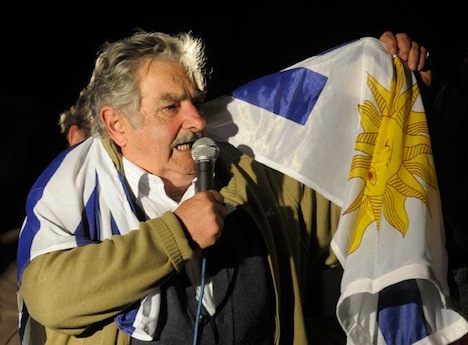Although Uruguay’s austere president José Mujica grows chrysanthemums with his wife in his humble home outside Montevideo in his spare time, that’s not the kind of flower power that’s catapulted him to global headlines this week.![]()
Instead, he’s moved forward, surpassing a key hurdle in making Uruguay, the Southern Cone nation of 3.3 million, the first country in the world to decriminalize and regulate the sale and purchase of marijuana when the lower house of Uruguay’s parliament, the Cámara de Representantes (Chamber of Representatives) passed a legalization bill by a narrow 50-46 margin late Wednesday, which will allow the bill to sail smoothly through the upper house and to enactment.
Far from transforming Uruguay into a drug haven, however, Simon Romero, writing for The New York Times, explains the highly regulated nature of what will become the Uruguayan marijuana market, which would place strict limits on the growth, use and sale of the drug:
Under the bill, which could become law as early as this month, people would be allowed to grow marijuana in their homes, limited to six plants per household. They would also be permitted to form cooperatives allowed to cultivate 99 plants. In addition, private companies could grow marijuana under the bill, though their harvests could be bought only by the government, which would market the drug in licensed pharmacies.
To buy marijuana in pharmacies, Uruguayans would be required to enter their names into a federal registry, which is intended to remain confidential, and would be limited to buying 40 grams per month. And in a move to prevent foreign tourists from flocking to Uruguay to smoke marijuana, the legislation would restrict legal purchases to Uruguayans. Marijuana use is already largely tolerated by the Uruguayan authorities.
As remarkable as it seems, and despite international criticism of the Uruguayan measure, it was only a matter of time before a Latin American country takes the step to legalize the drug. Colombian president Juan Manuel Santos and Guatemalan president Otto Pérez Molina, neither of whom are exactly left-wing ideologues have both made strident calls for marijuana legalization, and other Latin American leaders, such as former Mexican president Felipe Calderón, have called into question the longstanding U.S. anti-drug policy that’s launched a 40-year ‘War on Drugs’ that turned out to become more a war on Latin America, wreaking havoc and escalating violence from México to Perú. Even within the United States, public opinion is turning away from criminalization — California’s ‘medical’ marijuana industry is booming and voters in Washington and Colorado elected in November 2012 to legalize marijuana in those states.
What’s even more remarkable is the rise of the Uruguayan president who’s likely to be the first to make it happen. In a region with sometimes eccentric leaders, the 78-year old Mujica — or as he’s affectionately known among Uruguayos, ‘Pepe’ — stands out.
A former leftist guerrilla in the Tupamaros movement, Mujica spent much of Uruguay’s military government that spanned the 1970s and early 1980s in prison. As Romero writes in a profile of Mujica for The Times earlier this year, prison life was about as grim as imaginable for the one-time rebel fighter:
He spent 14 years in prison, including more than a decade in solitary confinement, often in a hole in the ground. During that time, he would go more than a year without bathing, and his companions, he said, were a tiny frog and rats with whom he shared crumbs of bread.
The sometimes violent tactics of the Tupamaros, which drew its inspiration from Fidel Castro’s Cuban guerrilla effort, weren’t without controversy. But though he rarely discusses those days, his wife, Lucía Topolansky, is also a former Tupamaro, and while he has long since eschewed the more radical elements of his past, he has retained a strikingly humble approach to material wealth. Mujica, who drives himself in a 1987 Volkswagen Beetle, has been labeled by the BBC to label him as ‘the world’s poorest president’:
President Mujica has shunned the luxurious house that the Uruguayan state provides for its leaders and opted to stay at his wife’s farmhouse, off a dirt road outside the capital, Montevideo. The president and his wife work the land themselves, growing flowers. This austere lifestyle – and the fact that Mujica donates about 90% of his monthly salary, equivalent to $12,000 (£7,500), to charity – has led him to be labelled the poorest president in the world.
As president, he has presided over a strong economy, though the GDP growth rate has fallen from 8.9% in 2010 to 5.7% in 2011 and an estimated 3.5% in 2012 — a slowing growth rate, yes, but one that’s consistently overperformed Brazil’s GDP growth in the past three years, one that is now overperforming the increasingly troubled Argentine economy, and one that would make the United States or the European Union feel like it’s experiencing an economic boom. Mujica has been an aggressive champion of freer trade, and for expanding Mercosur, the South American free trade bloc. He’s also a proponent of wind and other forms of renewable energy, and he’s a tireless booster of Uruguay exports, half of which are agricultural products, notably beef and grain products.
But his real legacy, even before the push for marijuana legalization, has been on social policy. Yesterday, for example, Uruguay’s same-sex marriage act took effect after the Chamber of Deputies passed the law on an 81-6 vote last December. He’s also signed legislation legalizing abortion restrictions. But while those measures had broad popular appeals, polls have shown that up to two-thirds of Uruguayan voters are wary of legalizing marijuana.
As Uruguayan presidents cannot run for consecutive terms in office, much of Mujica’s devil-may-care approach to controversial issues, especially drug legalization, lies in the fact that he’s not running for reelection. But it’s also in keeping with his honest, everyman persona, which has afforded him broad popularity, even among his critics. That popularity has made it easier for Mujica to champion unpopular issues, just as it has made it easier to deflect the loquacious president’s gaffes, such as when he was caught on tape disparaging both Argentine president Cristina Fernández de Kirchner and her late husband, former president Néstor Kirchner: ‘esta vieja es peor que el tuerto,‘ which roughly translates to ‘the old woman is worse than the cross-eyed one.’
But unlike the Kirchners, who have hewn a relatively populist neo-Peronista course for Argentina, which remains shut out of global capital markets, and unlike other leftists like the late Hugo Chávez and Nicolás Maduro in Venezuela, Mujica has been firmly on the lulista left, and like former Brazilian president Luiz Inácio Lula da Silva, he’s spent his political career moving from leftist roots — even more radical than Lula’s trade union roots in Brazil — to the political center. Continue reading Meet José Mujica, the Uruguayan president who’s on the path to legalizing marijuana

